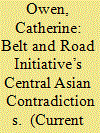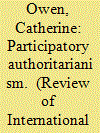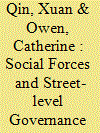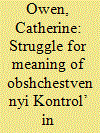|
|
|
Sort Order |
|
|
|
Items / Page
|
|
|
|
|
|
|
| Srl | Item |
| 1 |
ID:
174203


|
|
|
|
|
| Summary/Abstract |
This essay considers the nature of China’s Belt and Road Initiative (BRI) in Central Asia. Rather than a “grand strategy” coordinated by Beijing, it is better seen as a decentered, contradictory network of transnational clientelist relationships and semiautonomous profit-seeking institutions. While building much-needed infrastructure, these projects serve to enrich local political elites while fueling resentment and suspicion among their populations. Evidence for this argument is presented from three spheres: the principal implementers of the BRI, the main projects that have been enacted under its auspices in Central Asia, and examples of how these projects have been marred by elite corruption and local protest.
|
|
|
|
|
|
|
|
|
|
|
|
|
|
|
|
| 2 |
ID:
167688


|
|
|
|
|
| Summary/Abstract |
This paper challenges dominant understandings of ‘rising powers’ by developing a decentred, relational account of Russia and China in Central Asia. We ask whether Moscow and Beijing’s regional integrative strategies do not guide, but rather are led by, everyday interactions among Russian and Chinese actors, and local actors in Central Asia. Rising powers, as a derivative of ‘Great Powers’, are frequently portrayed as structurally comparable units that concentrate power in their executives, fetishise territorial sovereignty, recruit client states, contest regional hegemony and explicitly oppose the post-1945 international order. In contrast, we demonstrate that the centred discourse of Eurasian integration promoted by Russian and Chinese leaders is decentred by networks of business and political elites, especially with regard to capital accumulation. Adopting Homi K. Bhabha’s notion of mimicry (subversion, hybridity) and J. C. Scott’s conception of mētis (local knowledge, agency), and using examples of Russian and Chinese investments and infrastructure projects in Central Asia, we argue that in order to understand centring discourse we must look to decentring practices at the periphery; that is, rising power is produced through ongoing interactions between actors at the margins of the state’s hegemonic reach.
|
|
|
|
|
|
|
|
|
|
|
|
|
|
|
|
| 3 |
ID:
158723


|
|
|
|
|
| Summary/Abstract |
Scholars of International Relations have called for the creation of a post-Western IR that reflects the global and local contexts of the declining power and legitimacy of the West. Recognising this discourse as indicative of the postcolonial condition, we deploy Homi Bhabha’s concept of mimicry and James C. Scott’s notion of mētis to assess whether international political dynamics of a hybrid kind are emerging. Based on interviews with Central Asian political, economic, and cultural elites, we explore the emergence of a new global politics of a post-Western type. We find that Russia substantively mimics the West as a post-Western power and that there are some suggestive examples of the role of mētis in its foreign policy. Among Central Asian states, the picture is more equivocal. Formal mimicry and mētis of a basic kind are observable, but these nascent forms suggest that the dialectical struggle between colonial clientelism and anti-colonial nationalism remains in its early stages. In this context, a post-Western international politics is emerging with a postcolonial aspect but without the emergence of the substantive mimicry and hybrid spaces characteristic of established postcolonial relations.
|
|
|
|
|
|
|
|
|
|
|
|
|
|
|
|
| 4 |
ID:
175532


|
|
|
|
|
| Summary/Abstract |
This article explores the way in which Russian and Chinese governments have rearticulated global trends towards active citizenship and participatory governance, and integrated them into pre-existing illiberal political traditions. The concept of ‘participatory authoritarianism’ is proposed in order to capture the resulting practices of local governance that, on the one hand enable citizens to engage directly with local officials in the policy process, but limit, direct, and control civic participation on the other. The article explores the emergence of discourses of active citizenship at the national level and the accompanying legislative development of government-organised participatory mechanisms, demonstrating how the twin logics of openness and control, pluralism and monism, are built into their rationale and implementation. It argues that as state bureaucracies have integrated into international financial markets, so new participatory mechanisms have become more important for local governance as government agencies have lost the monopoly of information for effective policymaking. Practices of participatory authoritarianism enable governments to implement public sector reform while directing increased civic agency into non-threatening channels.
|
|
|
|
|
|
|
|
|
|
|
|
|
|
|
|
| 5 |
ID:
183237


|
|
|
|
|
| Summary/Abstract |
This article interrogates the operating logic of China's street-level regulatory state, demonstrating that residents’ committees (RCs) assume a role as regulatory intermediaries to enhance the efficiency of local governance. Using Shanghai's new recycling regulations as a case study, it explores the mechanisms by which RCs elicit not only citizens’ compliance but also active participation. We show that the central mechanisms derive from the RCs’ skilful mobilization of particular social forces, namely mianzi and guanxi, which are produced within close-knit social networks inside Shanghai's housing estates (xiaoqu). We advance three arguments in the study of China's emerging regulatory state. First, we show how informal social forces are employed in regulatory governance at the street level, combining authoritarian control with grassroots participation. Second, the focus on RCs as regulatory intermediaries reveals the important role played by these street-level administrative units in policy implementation. Third, we suggest that the RCs’ harnessing of informal social forces is essential not only for successful policy implementation at street level but also for the production of the local state's political legitimacy.
|
|
|
|
|
|
|
|
|
|
|
|
|
|
|
|
| 6 |
ID:
154366


|
|
|
|
|
| Summary/Abstract |
This article explores contrasting conceptions of the essentially contested concept obshchestvennyi kontrol’, as understood by the anti-systemic opposition and the Kremlin. It shows that the period of contention accompanying the 2011–2012 elections allowed competing narratives of this concept to emerge. First, the opposition presented it as a means for citizens to hold corrupt authorities accountable to the law; second, the Kremlin promoted it as a means to enhance government efficiency. The article shows that the Kremlin has co-opted the counter-hegemonic discourse into a new law which delimits the possibilities for enacting this concept in a fashion that recalls Soviet governance practices.
|
|
|
|
|
|
|
|
|
|
|
|
|
|
|
|
|
|
|
|
|